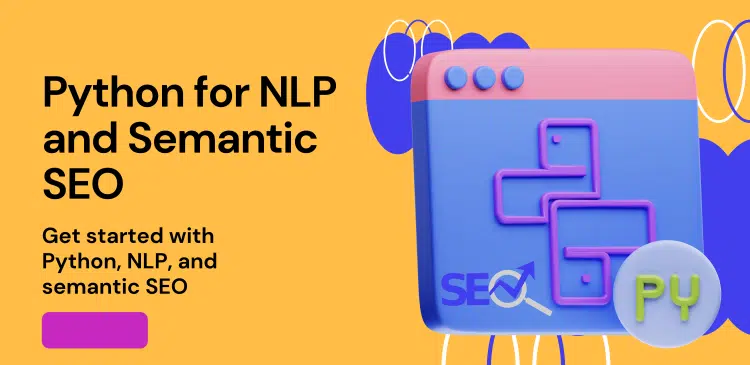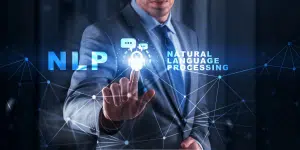How to Use Python for NLP and Semantic SEO?

Python is one of the most used languages in natural language processing and semantic SEO because it is simple, flexible, and has many libraries appropriate for text analytics and processing. Here’s a brief on how to get started with Python, NLP, and semantic SEO.
Applying NLTK to Basic NLP Tasks
NLTK stands for Natural Language Toolkit and is one of the most used libraries for Python-based NLP.
Here are some key ways NLTK can be used:
– Tokenization: Dividing text into words, punctuation, etc. The simplest forms of tokenization are word, sentence, and paragraph tokenization, which are available in NLTK.
– Part-of-Speech Tagging: Using labels such as the noun, the verb, and the adjective to identify words according to their parts of speech. This one assists in comprehending the different parts of a sentence.
– Stemming and Lemmatization: Converting all the words to the stem form. This is helpful for normalization before analysis.
– Syntax Analysis: Breaking down sentences to grasp grammatical structures and dependencies between words. This enables deeper semantics.

Thus, NLTK offers the elements that are helpful for many NLP and SEO tasks of understanding and transforming text.
Machine Learning for Text Classification and Topic Modeling
Python, for instance, has excellent machine learning frameworks such as Scikit-Learn that can be used on text.
Common uses include:
– Text Classification: It is possible to automatically sort documents based on the topic in which they are classified. Can help tag site content.
– Topic Modeling: Identify keywords and subjects in a set of documents. Helps understand content.
– Sentiment Analysis: Find out if the sentiment expressed in a text is positive, negative, or non-committal. This is helpful in managing the online reputation of a business or an organization.
Applying such algorithms to site content and data such as customer reviews can help in content and SEO plans and direction by revealing the themes, sentiment, and linkages within the content.
Web Scraping for Gathering Structured Data
Besides the data collected on a site, web scraping can also retrieve other external data such as ratings, reviews, search result numbers, and many others that are useful in SEO. Some Python libraries that make scraping easier include Beautiful Soup and Selenium.
Typical applications:
– Estimate the search volumes and positions of the sites by crawling for keywords from the search engines.
– Collect reviews, ratings, and sentiments of products, places, or even competitors.
– Create datasets for local businesses, job openings, or properties that are related to the industry you are in.
The identification of the structure of the data can help in finding SEO prospects- long-tail key phrases or link-building prospects.
Generating Text Content Using Python
In the case of sites requiring many pages of content, Python’s NLP capability can further be used to auto-generate human-readable text content. This can help in creating SEO content.

Popular Python libraries for text generation like GPT-2 provide functionality for:
– Summarizing text and using it to respond to questions without human intervention
– Condensing lengthy documents into brief summaries
– Conveying the content translated or paraphrased in other languages
Python can assist in such things as site FAQs, localized content, landing page summaries, and so on. Though it may require a touch of human editing or fine-tuning, especially for the first piece to be published, it has made writing tremendously easier.
There are several ways of enhancing content to improve its relevance for semantic search.
Today, semantic search—i.e., search which gets at the meaning behind the words–is becoming the major trend in SEO.
Python NLP capabilities help optimize and structure content to improve relevance for semantic search engines by:
– Incorporating such attributes as ratings and prices as well as other patterns that the search engines can easily recognize
– Augmenting meta tags, keywords, and links, for which NLP algorithms can analyze the content of Webpages
– Recognizing question-and-answer patterns and links between entities in a page
– Creating extra content in the type of tables and infographics to convey information in the form of illustrations
As semantic search becomes prevalent, utilizing Python’s NLP strength to improve content structure, relevance, and meaning is a valuable use for SEO.
Conclusion
Python offers a vast number of libraries for NLP and text processing, ranging from simple text analysis to machine learning for text generation. Here, Python integrates several tools to flexibly analyze, enhance, extend, and optimize website textual material for NLP-based tasks and to increase relevance for semantic search. The increasing usage of semantic search makes such capabilities of Python efficient for modern SEO.

 Bill Yeager, Co-Owner of High Point SEO & Marketing in CT
Bill Yeager, Co-Owner of High Point SEO & Marketing in CT